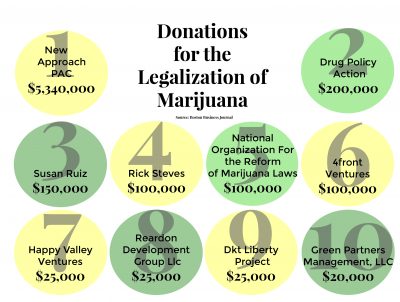
On Election Day, Massachusetts voters will vote on an issue possibly even more controversial than Donald Trump versus Hillary Clinton: the legalization of marijuana. Question 4 on the Massachusetts ballot will decide on the establishment of a legal marijuana industry within the commonwealth.
Beyond the ballot, however, campaigns and businesses throughout Massachusetts and the nation are fighting to have their voices heard in the Question 4 debate.
The “Yes on 4” campaign was established by a group of local and national advocates in favor of marijuana regulation and taxation within Massachusetts, according to the campaign’s website. Last summer, the group Regulate Massachusetts drafted a ballot initiative that was soon certified by the Attorney General, and attracted over 105,000 signatures.
Some of the top 10 contributors to the campaign, according to the Boston Business Journal, were 4Front Ventures, the National Organization for the Reform of Marijuana Laws, the Drug Policy Action and the New Approach Political Action Community.
“We need to help demonstrate to the public that marijuana can be used and distributed in a way that’s highly responsible,” said Kris Krane, the president of 4Front Ventures, a Massachusetts-based consulting company that works to streamline the legal cannabis industry.
“Changing public perception on the issue and stereotypes would eventually change attitudes, minds and laws,” he added.
Krane has spent most of his career working on policy reform and ending the war on drugs, he explained. Therefore, supporting Question 4 was natural. 4Front Ventures has contributed $25,000 to the “Yes on 4” campaign, according to the BBJ.
Another contributor to the campaign is the National Organization for the Reform of Marijuana Laws. According to the BBJ, the organization has contributed nearly $100,000 to the campaign.
NORML supports the passage of Question 4 because the group wants to see a regulated, transparent marijuana market rather than the present underground criminal market, explained Paul Armentano, deputy director of NORML.
“Marijuana laws and regulations, like alcohol laws and regulations, will continue to evolve and amend over time,” Armentano said. “But in order to get the point where we can begin to have a rational conversation with regard to marijuana and marijuana policy, we need to live in an environment where marijuana is no longer classified as contraband.”
Krane and Armentano both stressed the fact that a marijuana market will continue to exist whether or not Question 4 is passed. Therefore, they argue, government oversight on the pot industry would offer some sort of regulation on an otherwise unsupervised process.
“Despite over 100 years of criminal marijuana prohibition in Massachusetts, the use of marijuana and the existence of the marijuana market is here to stay,” Armentano said. “Our laws need to reflect this reality.”
In contrast, the Archdiocese of Boston has been a major force in the anti-legalization of marijuana movement. The Archdiocese has contributed $850,000 in opposition to Question 4, according to The Boston Globe.
Many of the Archdiocese’s concerns stem from the potency of marijuana and how it could pose a risk to children and families, explained Terrence Donilon, the spokesperson for the Archdiocese. It is also concerned about the presence of marijuana marketing and advertising, he said.
“The legalization of marijuana will prey on young people and immigrants,” Donilon said. “There will be no limits on potency if Question 4 is passed. Marijuana today is six times more potent than the 1970s.”
Another important factor in their decision to oppose Question 4 is the increased risk to youths. Since Boston is a college town, the Archdiocese urges parents to think twice about sending their children to school in a place where the marijuana industry will be exploding, the Archdiocese spokesperson said.
“We educate nearly 40,000 students in our schools and have a presence in 144 cities and towns through our 289 parishes,” Donilon said. “We hold our responsibility for the safety and well-being of children and families as paramount in all that we do.”
It’s up to Massachusetts to decide on Question 4. However, regardless of the outcome, the legalization push has successfully created ripples in the business community, as organizations are forced to consider the reality of a pot-legal Massachusetts.
“Question 4 is a starting point,” Armentano said, “not an end point.”













